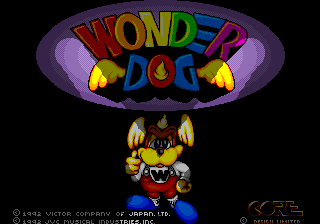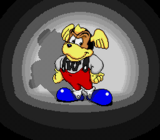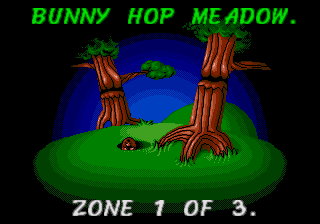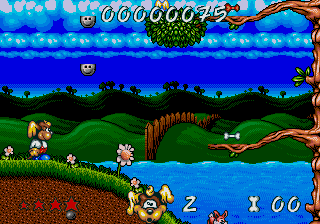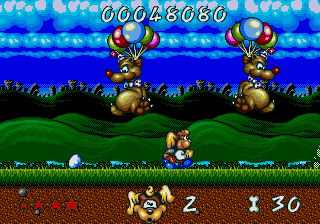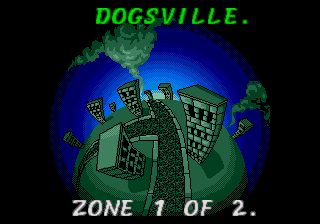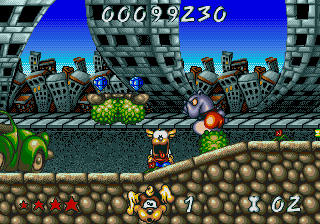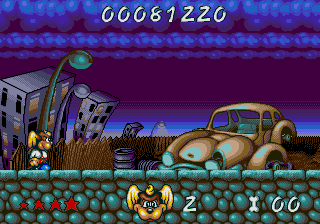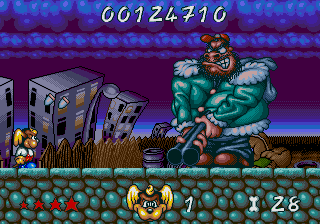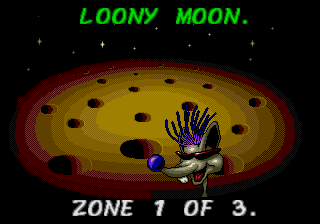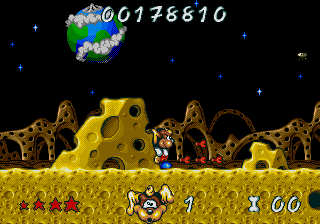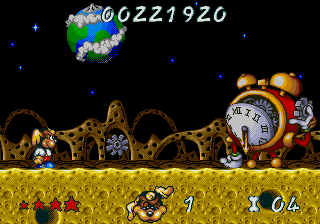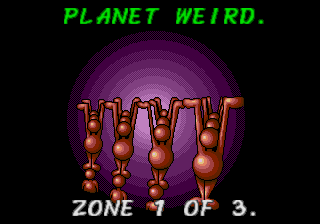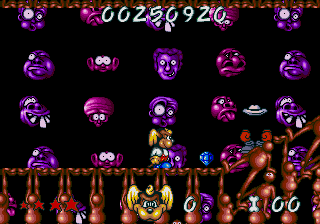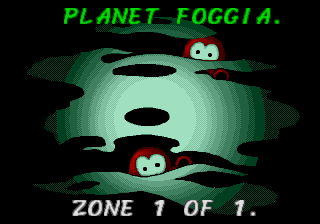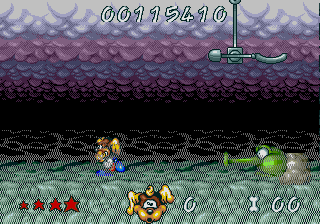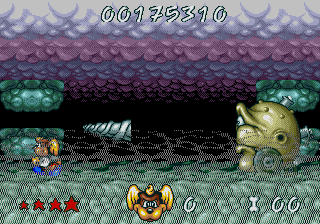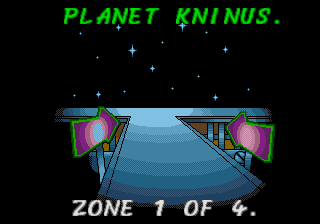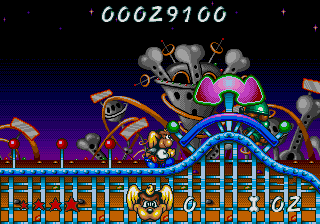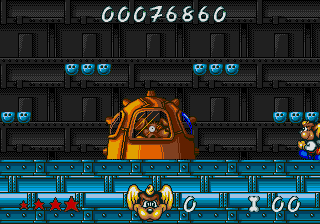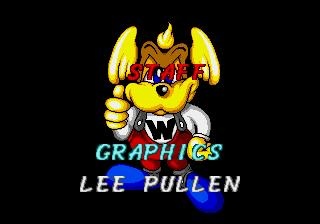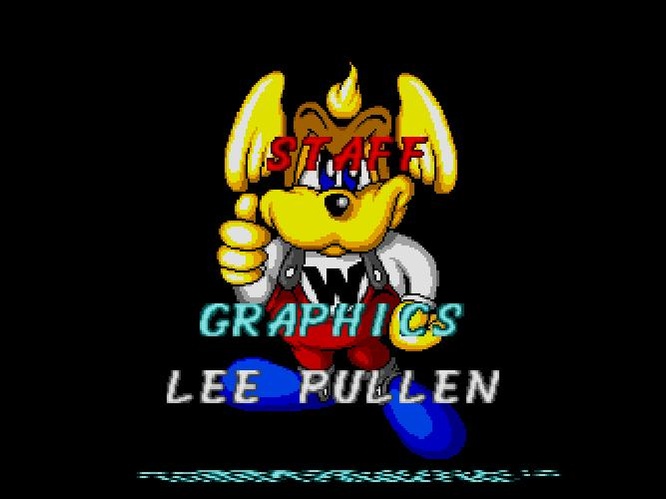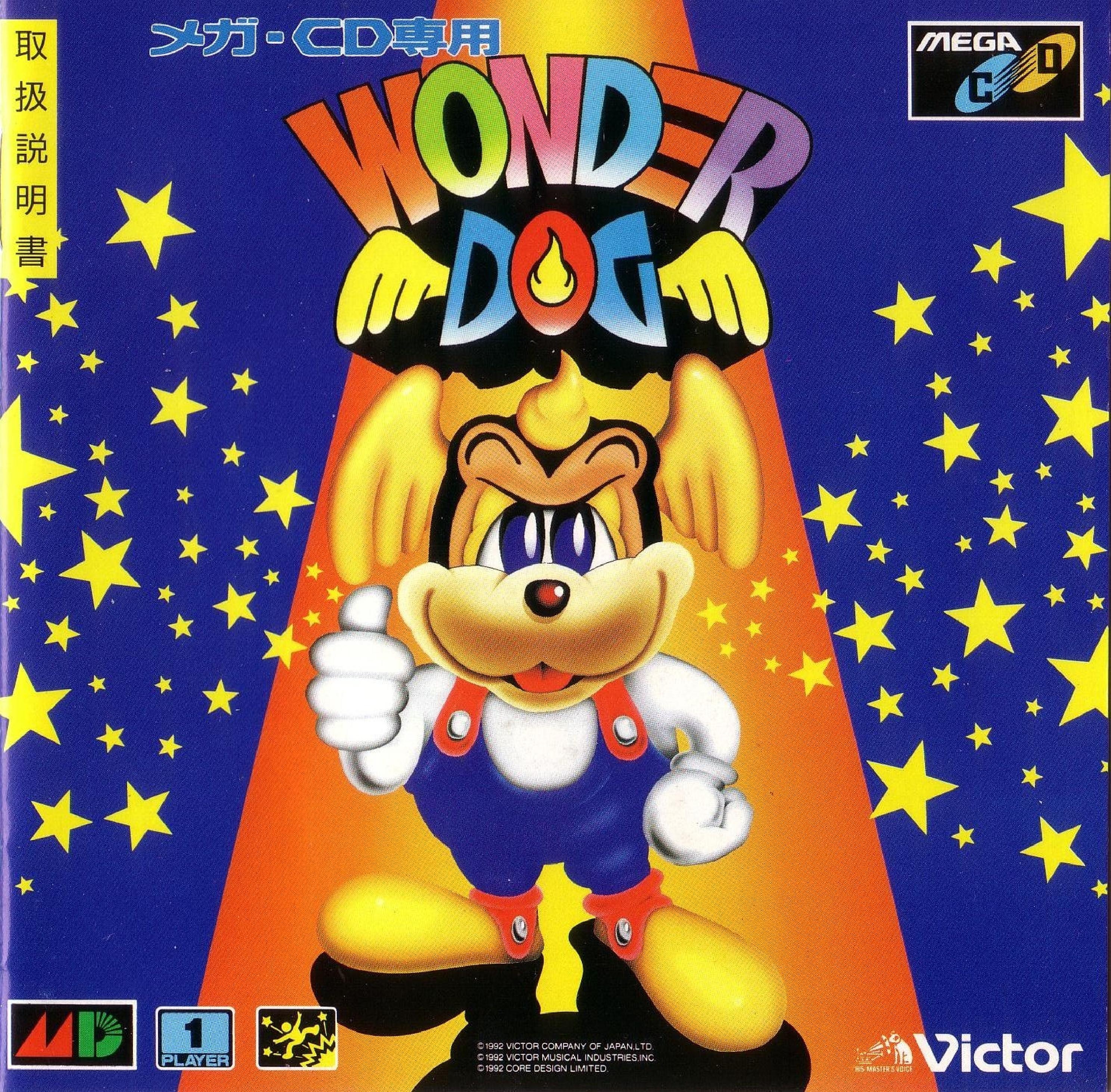Wonder Dog (ワンダードッグ) is a platform game for the Sega Mega-CD by Core Design featuring Wonder Dog, a mascot for Victor and the Wondermega during the early 1990s. Core Design later ported it to the Amiga for a Europe-only release.
Story
The peaceful dog-ruled planet K-9 finds itself under attack by the evil Pit Bully empire. In a last-ditch effort to save his world, Dr. Kibble fast tracks the Wonder Dog project, an experiment to create a super-powered dog. Running out of time, he tests the serum on his newborn son and sends him to Earth with a special outfit called the Wonder Suit. His son crash lands on the planet and immediately befriends a boy. However, the two are separated as the boy's father does not let him keep the dog. The dog then returns to the ship, dons the Wonder Suit, and becomes Wonder Dog, who must save the planet K-9 from the Pit Bully invasion.
Gameplay
The game is a platformer with controls similar to the Super Mario Bros. games. Wonder Dog moves with  and
and  and runs by holding
and runs by holding  . He jumps with
. He jumps with  and can defeat enemies by jumping on them. He can jump farther and higher while running. Holding
and can defeat enemies by jumping on them. He can jump farther and higher while running. Holding  in midair allows Wonder Dog to use his ears to glide. He performs the Spin Dig, which digs into certain terrain, with
in midair allows Wonder Dog to use his ears to glide. He performs the Spin Dig, which digs into certain terrain, with  +
+ . Wonder Dog can shoot stars with
. Wonder Dog can shoot stars with  for a ranged attack. The speed, distance, and trajectory of the stars fired depends on the Star Power gauge, which is increased by firing multiple stars in quick succession or by holding the fire button.
for a ranged attack. The speed, distance, and trajectory of the stars fired depends on the Star Power gauge, which is increased by firing multiple stars in quick succession or by holding the fire button.
If Wonder Dog is hit by an enemy, he loses a hit point. He has three total, which can be replenished by finding a Wings item. If he loses all of his hit points, he loses a life. Lives are limited but can be found throughout the game or when 100 Bones are collected. The game ends when the player runs out of lives but can be continued from the start of the current stage.
The goal of the game is to make it to the end of the stage. Stages are mostly linear, but each stage has several hidden areas containing bonus items. There are two hidden stages that can be discovered as well. Many stages contain invisible platforms, which can be revealed by finding a Smiley item.
Items
|
|
Bone
|
| Increases the player's bone count. Awards an extra life when 100 are collected.
|
|
|
Wings
|
| Restores the player's hit points to full.
|
|
|
Blue Diamond
|
| Awards the player with 1,000 points.
|
|
|
Green Diamond
|
| Awards the player with 2,000 points.
|
|
|
Red Diamond
|
| Awards the player with 5,000 points.
|
|
|
1-Up
|
| Awards the player with an extra life.
|
|
|
Smiley
|
| Reveals hidden platforms in the current stage.
|
|
|
Invulnerability
|
| Transforms Wonder Dog into a tornado, during which he is impervious to damage.
|
|
|
Restart Flag
|
| Checkpoint where Wonder Dog is revived after losing a life.
|
Stages
|
|
Bunny Hop Meadow
|
| This stage consists of 3 zones, plus the hidden stage Underground.
|
|
|
Dogsville
|
| Password: MYSTIC
|
| This stage consists of 2 zones.
|
|
|
Scrapyard
|
| Password: ANKLES
|
| This stage consists of 2 zones.
|
|
|
Loony Moon
|
| Password: LEDZEP
|
| This stage consists of 3 zones, plus the hidden stage Moon Mines.
|
|
|
Planet Weird
|
| Password: REEVES
|
| This stage consists of 3 zones.
|
|
|
Planet Foggia
|
| Password: PIXIES
|
| This stage consists of 1 zone.
|
|
|
Planet Kninus
|
| Password: WOOPIE
|
| This stage consists of 4 zones. It is called Planet K-9 in some versions.
|
Production credits
Overseas version
- Graphics: Lee Pullen
- Programming: Chris Long
- Design: Bob Churchill
- Music and SFX: Martin Iveson
- Support Programmer: John Kirkland, Ged Keaveney
- Intro Animation: Billy Allison
- Intro Programmer: Sean Dunlevy
- Font Design: Simon Phipps
- Game Help: Rob Toone
- Extra Sound: Stew Perkins
- Directors: Takeshi Minagawa, Toshiyuki Nagai
- Mega-CD Help: Yoshiaki Iwasawa
- Promoter: Kaku Maetani
- Thanks to: Kaoru Tomiyama
- Big Boss: Jeremy Smith
- Producer: Isamu Senda
- Executive Producer: Satoshi Honda
Source: In-game credits (US)[9]
Japanese version
- Graphics: Lee Pullen
- Programming: Chris Long
- Design: Bob Churchill
- Music and SFX: Martin Iveson
- Support Programmer: John Kirkland, Ged Keaveney
- Intro Animation: Billy Allison
- Intro Programmer: Sean Dunlevy
- Font Design: Simon Phipps
- Game Help: Rob Toone
- Project Manager: Takeshi Minagawa
- Mega-CD Help: Yoshiaki Iwasawa
- Promoter: Kaku Maetani
- Thanks to: Toshiyuki Nagai, Kaoru Tomiyama
- Big Boss: Jeremy Smith
- Producer: Satoshi Honda
Source: In-game credits (JP)[10]
Core Design Staff
- Main Programmer: Chris Long
- Assistant Programmer: John Kirkland, Ged Keaveney
- Main Graphics: Lee Pullen
- Game and Map Design: Bob Churchill
- Intro Graphics: Billy Allison
- Intro Programming: Sean Dunlevy
- Music: Martin Iveson
- Play-testing: Mark and Darren Price
- Producer: Jeremy Smith
Victor M.I. Staff
- Executive Producer: Satoshi Honda
- Producer: Isamu Senda
- Director: Toshiyuki Nagai, Takeshi Minagawa
- Marketing: Katsumi Arai, Harunobu Komori, Toshimichi Kawamura, Shunji Nishizawa, Kouki Minami, Kaku Maetani, Yae Uchida, Katsura Iino
- Package Design: Victor Company of Japan, Ltd. Design Center
- Manual: Comix Brand (Takayuki Minegishi, Takuji Hikino), Etsuko Matsuoka
Source: JP manual[11]
Magazine articles
- Main article: Wonder Dog/Magazine articles.
Promotional material
- Main article: Wonder Dog/Promotional material.
Physical scans
| Sega Retro Average
|
| Publication
|
Score
|
Source
|
|
|
67
|
|
|
| Mega-CD, JP
|
  Cover
|
|
|
| Mega-CD, US (Red)
|
  Cover
|
 Disc  Manual |
| Mega-CD, US (Green)
|
|
|
 Disc  Manual |
| Mega-CD, EU
|
  Cover
|
|
|
| Mega-CD, FR (Blister pack)
|
 Cover
|
|
|
Technical information
ROM dump status
| System |
Hash |
Size |
Build Date |
Source |
Comments |
|
|
|
| ✔
|
|
590,707,152
|
|
CD (JP)
|
T-60074
|
|
|
|
| ?
|
|
600,442,080
|
|
CD (US)
|
T-6402
|
|
|
|
References
- ↑ File:WonderDog MCD JP Box Front.jpg
- ↑ 2.0 2.1 https://sega.jp/fb/segahard/mcd/soft_licensee.html (Wayback Machine: 2019-06-10 17:56)
- ↑ Beep! MegaDrive, "October 1992" (JP; 1992-09-08), page 10
- ↑ https://groups.google.com/g/rec.games.video/c/QuLdzl-h2SA/m/YgUgdW8Vfk4J
- ↑ GamePro, "January 1993" (US; 199x-xx-xx), page 73
- ↑ Sega Force Mega, "January 1994" (UK; 1993-12-16), page 8
- ↑ 7.0 7.1 Computer & Video Games, "July 1993" (UK; 1993-06-15), page 38
- ↑ Play Time, "Sonderheft 1/94" (DE; 1994-03-30), page 22
- ↑ File:Wonder Dog MCD US credits.pdf
- ↑ File:Wonderdog MCD JP SSCredits.pdf
- ↑ File:Wonderdog mcd jp manual.pdf, page 14
- ↑ 1700 igr dlya Sega, "" (RU; 2001-xx-xx), page 266
- ↑ Beep! MegaDrive, "July 1992" (JP; 1992-06-08), page 35
- ↑ Consoles +, "Décembre 1992" (FR; 1992-1x-xx), page 100
- ↑ Computer & Video Games, "July 1993" (UK; 1993-06-15), page 108
- ↑ Electric Brain, "June 1993" (UK; 1993-05-26), page 18
- ↑ Famitsu, "1992-10-16" (JP; 1992-10-02), page 41
- ↑ GameFan, "Volume 1, Issue 1: October 1992" (US; 1992-xx-xx), page 6
- ↑ GamePro, "January 1993" (US; 199x-xx-xx), page 72
- ↑ Hippon Super, "September 1992" (JP; 1992-08-04), page 47
- ↑ Joypad, "Octobre 1992" (FR; 1992-10-xx), page 48
- ↑ Joypad, "Octobre 1993" (FR; 1993-xx-xx), page 94
- ↑ Joystick, "Novembre 1992" (FR; 1992-1x-xx), page 164
- ↑ Sega Mega Drive Advanced Gaming, "December 1992" (UK; 1992-xx-xx), page 16
- ↑ Sega Mega Drive Advanced Gaming, "May 1993" (UK; 1993-xx-xx), page 52
- ↑ Mega, "December 1992" (UK; 1992-11-19), page 54
- ↑ Mega Action, "July 1993" (UK; 1993-06-17), page 28
- ↑ Mega Action, "January 1994" (UK; 1993-12-30), page 42
- ↑ Mega Fun, "09/93" (DE; 1993-08-18), page 38
- ↑ Mega Machines, "March 1994" (UK; 1994-02-03), page 54
- ↑ MegaTech, "December 1992" (UK; 1992-11-20), page 46
- ↑ Marukatsu Mega Drive, "September 1992" (JP; 1992-08-xx), page 121
- ↑ Player One, "Février 1994" (FR; 1994-0x-xx), page 104
- ↑ Sega Pro, "December 1992" (UK; 1992-11-12), page 64
- ↑ Sega Pro, "April 1993" (UK; 1993-03-11), page 74
- ↑ Sega Force, "January 1993" (UK; 1992-12-10), page 76
- ↑ Sega Saturn Magazine, "September 1995" (JP; 1995-08-08), page 87
- ↑ Sonic the Comic, "January 21st 1994" (UK; 1994-01-08), page 11
- ↑ Supergame, "Abril 1993" (BR; 1993-04-xx), page 23
- ↑ Todo Sega, "Febrero 1994" (ES; 1994-0x-xx), page 44
![]() and
and ![]() and runs by holding
and runs by holding ![]() . He jumps with
. He jumps with ![]() and can defeat enemies by jumping on them. He can jump farther and higher while running. Holding
and can defeat enemies by jumping on them. He can jump farther and higher while running. Holding ![]() in midair allows Wonder Dog to use his ears to glide. He performs the Spin Dig, which digs into certain terrain, with
in midair allows Wonder Dog to use his ears to glide. He performs the Spin Dig, which digs into certain terrain, with ![]() +
+![]() . Wonder Dog can shoot stars with
. Wonder Dog can shoot stars with ![]() for a ranged attack. The speed, distance, and trajectory of the stars fired depends on the Star Power gauge, which is increased by firing multiple stars in quick succession or by holding the fire button.
for a ranged attack. The speed, distance, and trajectory of the stars fired depends on the Star Power gauge, which is increased by firing multiple stars in quick succession or by holding the fire button.
